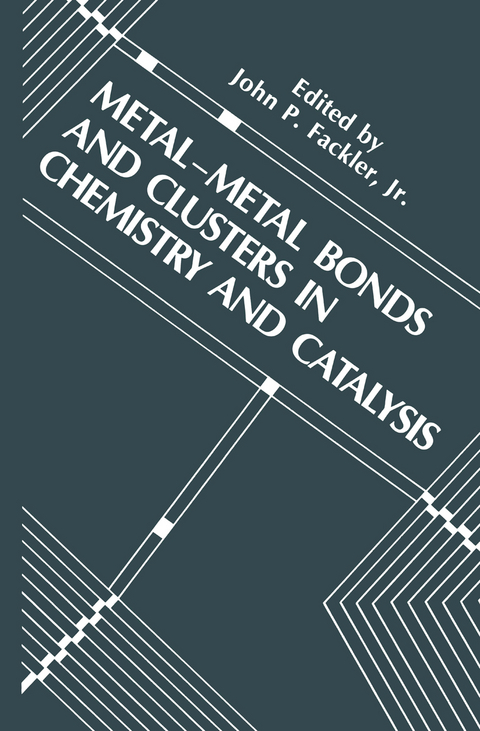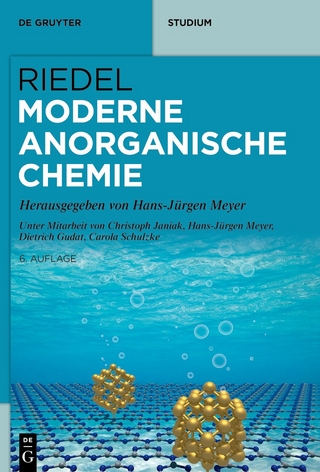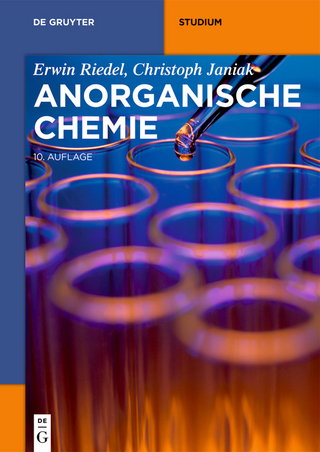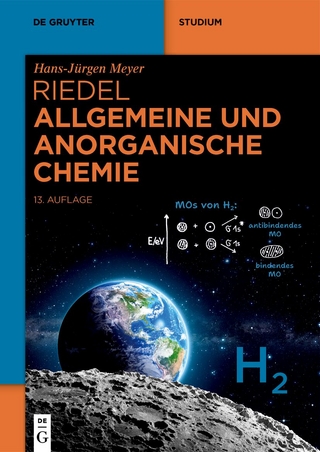
Metal-Metal Bonds and Clusters in Chemistry and Catalysis
Kluwer Academic/Plenum Publishers (Verlag)
978-0-306-43527-0 (ISBN)
Twenty-Five Years of Chemistry Since the Discovery of the Quadruple Metal-Metal Bond.- A Quarter-Century of Metal-Metal Multiple Bonds.- The Multiple Metal-Metal Bond: Twenty-Five Years of Synthetic Serendipity and Structural Discovery.- Theoretical Studies of Dinuclear Compounds with Multiple Metal-Metal Bonds.- Uses of Metal Clusters in Homogeneous and Heterogeneous Catalysis.- Reactivity of Dinuclear and Tetranuclear Clusters of Molybdenum and Tungsten.- Clusters and Their Implications for Catalysis.- Metal Clusters in the Solid State.- Clusters in Catalysis.- Nature of Bimetallic Clusters.- Thermochemical Aspects of Organotransition Metal Chemistry. Insights Provided by Metal-Ligand Bond Enthalpies.- Metal Clusters and Supported Metal Catalysts.- Mechanistic Features of Carbonyl Cluster Rearrangement.- Selective Oxidation Chemistry on Soluble Oxides: A Progress Report.- The Study of Clusters of Polylithium Organic Compounds and Structural Studies of Polylithium Organic Compounds.- Clusters in Materials.- Organometallic Chemical Vapor Deposition of GaAs and Related Semiconductors Using Novel Organometallic Precursors.- Surface Chemistry of Mixed-Metal Systems.- Organometallic Chemical Vapor Deposition of Aluminum Nitride and Aluminum Metal.- Solid State Carbon-13 NMR of Metal Carbonyls.- Surface Chemistry of Metal and Semiconductor Clusters.- Bonding and Spectroscopy in Clusters.- The Electronic Structure of Metal Dimers and Metal Clusters: The Eighteen-Electron Rule vs. Skeletal Electron-Pair Counting.- Experimental Measures of Metal-Metal Sigma, Pi, and Delta Bonding from Photoelectron Spectroscopy.- Formation, Structure and Luminescent Properties of Metal-Metal Bonded Compounds of the Late Transition Metal and Post Transition Metal Ions.- Abstracts.- The Preparation and Characterization of New Heteropolyoxofluorometalate Anion, [FeW17O56F6H5]8?.- Facile Exchange of Terminal, Doubly-Bridging, and Quadruply Bridging Carbonyl Ligands in Solution: Crystal Structure and Solution Dynamics of LWM3(CO)12H, L=C5H5, C5Me5 and M=Os,Ru.- Thermal Constants and Structure of Tin Clusters.- Reactivity and Isomerization of Mo2(ALLYL)4.- Surface Coordination/Organometallic Chemistry of Monometal and Bimetallic Electrocatalysts.- Ambient-Temperature Chloroaluminate Molten Salts: Solvents for Chloro Complex Electrochemistry and for Reductive Condensation Syntheses.- The Maximum Strength of the Chemical Bond between Two Metal Atoms.- Reactions of (?7-C7H7)M(?5-C5H5), M = Ti or Zr, with Carboxylic and Dithiocarboxylic Acids.- Model Hydrodesulfurization Systems: Reactions of Sulfur Containing Molecules on Ni(110).- Electrochemical Studies of Triangular Niobium Cluster, Nb3O2(SO4)6.3H2O5?, in Sulfuric Acid.- Reactivity of Dithioethers toward [Re2H8]2?.- Theoretical Investigations of the Metal-Metal Interactions within the Trinuclear Au2Pt(CH2(S)PH2)4 Complex.- Structural and Theoretical Studies on Heteronuclear Transition-Metal Clusters Containing the Alkylidyne Ligand.- Electronic Structure and Nature of Bonding in Transition Metal Dimers.- Theoretical Calculations on the Interaction of Bridging Carbonyls with Transition Metal Dimers.- Bimetallic Hydroformylation Catalysis.- 252CF-Plasma Desorption Mass Spectra of Very Large Clusters.- Systematic Kinetic Studies of Associative and Dissociative Reactions of Substituted Metal Carbonyl Clusters: The Intimate Mechanisms.- Mixed Pd-Au and Pt-Au Cluster Compounds.- Stability of Small Biclusters of Transition Metals with Semi-Conductors.- The Topology of the Total Charge Density in BinuclearTransition-Metal Complexes that Formally Contain Metal-Metal Bonds.- The Effect of Carbonyl Ligands on Osmium and Ruthenium Metal-Metal Bonds.- Contributors.
| Erscheint lt. Verlag | 30.9.1990 |
|---|---|
| Reihe/Serie | Industry-University Cooperative Chemistry Program Symposia |
| Zusatzinfo | X, 342 p. |
| Verlagsort | New York |
| Sprache | englisch |
| Maße | 156 x 234 mm |
| Themenwelt | Naturwissenschaften ► Chemie ► Anorganische Chemie |
| ISBN-10 | 0-306-43527-6 / 0306435276 |
| ISBN-13 | 978-0-306-43527-0 / 9780306435270 |
| Zustand | Neuware |
| Haben Sie eine Frage zum Produkt? |
aus dem Bereich


